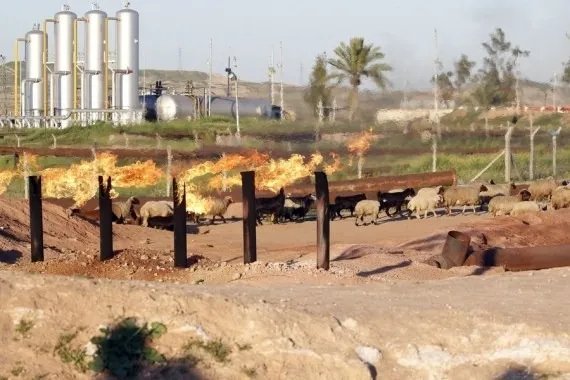Did Iraq Really Resume Oil Exports from the Kurdistan Region to Turkey After Two Years?

Synopsis
Key Takeaways
- Resumption of oil exports from Kurdistan to Turkey after two and a half years.
- This collaboration signifies a new era of economic cooperation between the Iraqi federal government and the Kurdistan Regional Government.
- Oil exports are crucial, accounting for over 90% of state revenues.
- The Iraq Vision 2050 aims to diversify the economy and reduce oil dependency.
- Key initiatives under this vision include job creation and enhancing self-sufficiency.
Baghdad, Sep 27 (NationPress) The Oil Ministry of Iraq declared on Saturday the revival of crude oil exports from the semi-autonomous Kurdistan region via the Iraq-Turkey pipeline, marking an end to a suspension that persisted for two and a half years.
The export activities commenced at 6 AM local time (0300 GMT) with remarkable efficiency and seamless operations, showcasing the successful collaboration between the Iraqi federal government and the Kurdistan Regional Government, according to a statement from the ministry.
“This progress signifies a crucial advancement towards enhancing the management of our national resources, fostering a spirit of partnership and high-level coordination that aids in the sustainability of oil exports and supports the national economy,” the statement emphasized.
On Thursday, Prime Minister Mohammed Shia' al-Sudani revealed a pact whereby the federal Oil Ministry will oversee the crude oil produced in the Kurdistan region and facilitate its export through the pipeline to Turkey.
Notably, Kurdish authorities had previously conducted independent oil sales through the Turkish port of Ceyhan without obtaining approval from Baghdad, as reported by Xinhua news agency. The pipeline had been inactive since March 2023 following an international arbitration ruling favoring Iraq in a dispute with Turkey over the Kurdish regional government’s unilateral oil sales.
Oil exports constitute over 90% of Iraq's state revenue, hence the resumption is a pivotal step towards revitalizing the nation's economy.
Last week, Prime Minister al-Sudani introduced a national development vision, asserting that the nation “cannot continue to depend solely on fossil fuels as the foundation of its economy.”
As per a statement from al-Sudani's media office, the Prime Minister attended the inauguration ceremony for the Iraq Vision 2050 for Development and Future on Saturday, joined by senior government officials, diplomats, and representatives from the private sector.
This vision aims to diversify Iraq's economy, minimize oil dependency, and enhance private sector involvement through structural reforms, according to the statement.
Key projects include establishing Iraq as a transit hub for 20% of Asia-Europe trade via the Al-Faw Grand Port and the Development Road project, anticipated to generate 1.5 million jobs, as stated.
The vision also targets achieving 70% self-sufficiency in food, water, and energy through sustainable green initiatives, with plans for an upcoming developmental roadmap to be submitted to the Council of Ministers for approval.
In light of technological advancements and the rise of artificial intelligence reshaping global economies, “Iraq aspires in the coming decades to free itself from oil dependency, aiming for a diversified and stable economy,” al-Sudani noted.
“Iraq Vision 2050 embodies a collective national direction, integrating state institutions, the private sector, universities, civil society, and youth,” he added.









